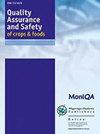不同贮藏条件下水稻微生物群落的培养依赖和非培养依赖分析
IF 5.3
3区 农林科学
Q1 FOOD SCIENCE & TECHNOLOGY
引用次数: 8
摘要
大米是世界上一半以上人口的主食,当水分含量和温度有利时,储存的大米可能会发生真菌变质。曲霉属和青霉属是产生有害真菌毒素的最有害的产毒物种。霉菌对公众健康构成潜在威胁,并造成巨大的经济损失。因此,了解霉菌是如何在水稻中繁殖的具有重要意义。本研究的重点是分离和鉴定水稻中存在的真菌及其在不同水分含量的水稻中的进化。每月采用聚合酶链反应-变性梯度凝胶电泳(PCR-DGGE)培养依赖性和非培养依赖性方法检测霉菌群落。在不同的贮藏条件下,传统培养方法检测到显著差异。在马铃薯葡萄糖琼脂(PDA)培养基上,高温、高湿条件下对优势菌株金黄色青霉(Penicillium auratiogriseum)和草酸青霉(Pencillium oxalicum)较为适宜。特别地,草霉菌竞争性地抑制其它真菌。对于玫瑰孟加拉培养基,在不同的储存条件下没有观察到差异,只检测到典型菌株,如白曲霉和链格孢。PCR-DGGE鉴定了木霉属、枝孢霉属等未培养菌株,限制曲霉菌属、atherium属等优势菌株和植物区系多样性。这些结果表明,储存条件极大地影响了真菌的生长。本研究为我国水稻贮藏过程中真菌区系的进化提供了基础,并有助于开发防止水稻霉菌污染的生物防治方法。本文章由计算机程序翻译,如有差异,请以英文原文为准。
Analysis of rice microbial communities under different storage conditions using culture-dependent and -independent techniques
Rice is a staple food for over half of the world’s population, and fungal spoilage in stored rice may occur when the moisture content and temperature are conducive. Aspergillus sp. and Penicillium sp. are the most harmful toxigenic species that produce harmful mycotoxins. Molds pose a potential threat to public health and cause a huge economic loss. Therefore, it is of great importance to find out how molds multiply in rice. This study focused on the isolation and identification of fungi presented in rice and their evolution in rice with different moisture contents stored for varying periods of time and under different temperatures. Mold community was detected every month using the culture-dependent and -independent method of polymerase chain reaction-denaturing gradient gel electrophoresis (PCR-DGGE). Significant differences were detected by the traditional culture method under different storage conditions. For potato dextrose agar (PDA) media, high temperature and moisture were suitable for the dominant strains including Penicillium aurantiogriseum and Penicillium oxalicum. In particular, P. oxalicum competitively inhibited the other fungi. For Rose Bengal medium, no difference was observed under different storage conditions, and only typical strains such as Aspergillus candidus and Alternaria were detected. PCR-DGGE identified some uncultured strains such as Trichoderma sp. and Cladosporium sp., the dominant strains and the flora diversity such as Aspergillus restrictus and Eurotium athecium. These results indicated that storage conditions greatly shape fungal growth. This study provides a foundation for the evolution of fungal flora in rice during storage in China and may help in developing biological control methods to prevent mold contamination in rice.
求助全文
通过发布文献求助,成功后即可免费获取论文全文。
去求助
来源期刊

Quality Assurance and Safety of Crops & Foods
FOOD SCIENCE & TECHNOLOGY-
CiteScore
4.60
自引率
7.50%
发文量
61
审稿时长
1 months
期刊介绍:
''Quality Assurance and Safety of Crops & Foods'' is an international peer-reviewed journal publishing research and review papers associated with the quality and safety of food and food sources including cereals, grains, oilseeds, fruits, root crops and animal sources. It targets both primary materials and their conversion to human foods. There is a strong focus on the development and application of new analytical tools and their potential for quality assessment, assurance, control and safety. The scope includes issues of risk assessment, traceability, authenticity, food security and socio-economic impacts. Manuscripts presenting novel data and information that are likely to significantly contribute to scientific knowledge in areas of food quality and safety will be considered.
''Quality Assurance and Safety of Crops & Foods'' provides a forum for all those working in the specialist field of food quality and safety to report on the progress and outcomes of their research.
 求助内容:
求助内容: 应助结果提醒方式:
应助结果提醒方式:


